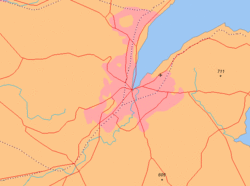Solitude (football ground)
 Entrance, west side | |
| Location | Cliftonville Street Belfast, Northern Ireland |
|---|---|
| Coordinates | 54°37′10″N 5°56′50″W / 54.61944°N 5.94722°W |
| Owner | Cliftonville FC |
| Operator | Cliftonville FC |
| Capacity | 8,000 (3,000 seated)[1] |
| Surface | Artificial[2] |
| Opened | 20 August 1890[3] |
| Tenants | |
| Cliftonville FC (1890- ) Newington (2018- ) | |
Solitude is a football stadium in Belfast, Northern Ireland. It is the oldest football stadium in Ireland, and the home ground of Ireland's oldest football club, Cliftonville.[4] The stadium holds 6,224, but is currently restricted to 2,530 under safety legislation.[5]
The stadium was built in 1890[6] and has undergone several renovations. In 2002, a new stand was built at one end of the ground to house visiting supporters, and in 2008, a new stand was completed behind the goal at the east end of the ground. A synthetic 3G pitch was installed to replace the previous grass surface in 2010.[7]
History
[edit]Solitude was opened in 1890 after Cliftonville moved across the road from Oldpark Avenue. The ground holds the distinction of having the first ever penalty in International Football taken there.[8] Previously consisting of two pitches (the second of which was sold off and now contains housing), Solitude is the oldest football ground in Ireland.
Solitude has hosted a number of cup finals and international games. During the 1890s and early 1900s Solitude was the home ground of Ireland, replacing the Ulster Cricket Ground at Ballynafeigh. During the 1890s, the ground hosted 11 home internationals. On 3 March 1894, after thirteen attempts Ireland, playing at Solitude, finally avoided defeat to England. Against an England team that included Fred Spiksley and Jack Reynolds, Ireland gained a 2–2 draw. Goals from Olphert Stanfield and W.K. Gibson inspired Ireland to come back from 2–0 down to gain a 2–2 draw. The ground continued to host Ireland internationals into the early 1900s, but was gradually replaced as Ireland's home ground by Windsor Park and Dalymount Park.
Stands
[edit]The ground contains the following stands:[9]
Main stand
[edit]
The main stand at Solitude, situated on the western side of the ground, is for Cliftonville supporters only. It is now a very old structure, having been constructed during the 1950s.[10] It has two tiers. The lower tier is terracing and seating, and the upper tier has a mixture of seating and benches. Its capacity is over 2,500 people.[citation needed]
The original stand was destroyed in January 1949 when a fire broke out after a Linfield v Glentoran Irish Cup tie. The match was staged at Solitude as Windsor Park had been closed for a month in the aftermath of the infamous 1948 Linfield v Belfast Celtic Boxing Day tie at which serious crowd trouble erupted.[citation needed]
Also contained within the main stand at Solitude is Cliftonville Social Club, Cliftonville's licensed premises.
Cliftonville are hoping to secure funding to replace the Main Stand with a modern fit for purpose structure.
The McAlery stand
[edit]The old Cage Stand was demolished and a new stand seating 1,600 was opened on 27 October 2008. Now known as the McAlery Stand in honour of our founder, it houses new facilities under this stand include dressing rooms.
Away End
[edit]
Often referred to as "The Bowling Green End" (due to the bowling green behind it), the away end on the north side of the ground underwent a major facelift in 2001, when the covered terracing used to house away fans was replaced by an 880 all-seated stand.
Waterworks Stand
[edit]The Waterworks Stand was temporarily erected first for a UEFA Champions League game against Scottish Champions Celtic. As of 2023 it has remained a grass bank and is used for television gantry purposes.
Whitehouse
[edit]The Whitehouse, not unlike "the Cottage" at Fulham's ground Craven Cottage, used to contain the changing facilities and the board room for the club. However due to funding issues no works have been done to upgrade the facilities.
Floodlights
Installed as part of a floodlight improvement project funded by the Irish Football Association through the UEFA HatTrick II Assistance Programme, Solitude’s new 800 lux constructions stand at 35 metres in height and were used for the first time in Cliftonville’s 4-0 defeat of Linfield on September 21, 2009.
See also
[edit]References
[edit]- ^ Adams, Duncan (April 2017). "Cliftonville FC - Solitude - Football Ground Guide". www.footballgroundguide.com.
- ^ "Finishing touches". cliftonvillefc.net. 6 August 2021.
- ^ "Cliftonville Football Club " History of Solitude". cliftonvillefc.net.
- ^ "Cliftonville closing in on another first". Belfasttelegraph.co.uk – via www.belfasttelegraph.co.uk.
- ^ "Sport NI Annual review 2008/09" (PDF). sportni.net. p. 18. Archived from the original (PDF) on 28 September 2013. Retrieved 14 May 2013.
- ^ Gunther Lades. "www.fussballtempel.net". fussballtempel.net. Archived from the original on 29 August 2009. Retrieved 21 August 2009.
- ^ "News: October 2010".
- ^ "New stadium: The old-timer called Solitude – StadiumDB.com". stadiumdb.com. Retrieved 4 January 2022.
- ^ Flynn, Barry (2009). Political Football. History Press, Dublin.
- ^ "Cliftonville Football Club » on the stand".

